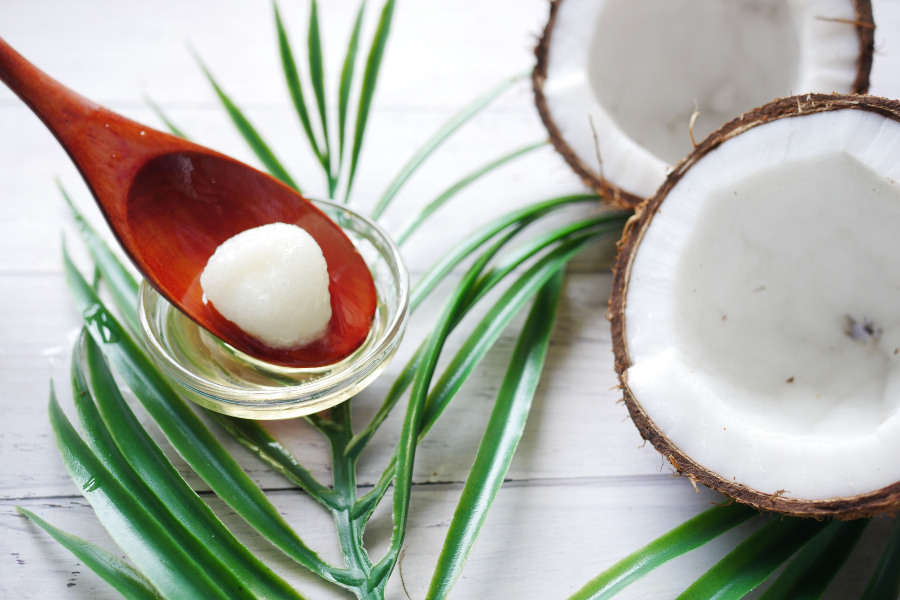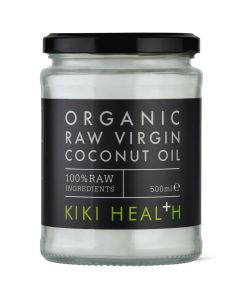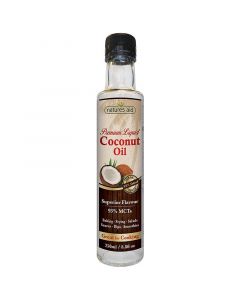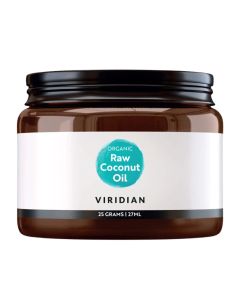
Is Coconut Oil Good For Your Hair? Let's Investigate
You've heard of the miraculous power of coconut oil. You've probably had a friend touting it as the ultimate hair treatment for silky locks. But as more people have started to use coconut oil within their beauty regimen, new stories have started emerging warning that coconut oil might not be the best thing to use on your hair because of unintended consequences, like causing damage rather than repairing.
So, to help gain some much needed clarity, we're going to break down, once and for all, if coconut oil is good for your hair.
Is Coconut Oil Good Or Bad For Your Hair?
The answer isn't as black and white as one might hope. There are times when coconut can be good for your hair, and some uses that make coconut oil bad for your hair. To explain why, we need to look at what we know about coconut oil as a substance.
Coconut Oil Contains Beneficial Nutrients
Coconut oil contains vitamin E, which we know is important for skin and hair health, and lauric acid, which has antibacterial properties. Combined, it seems these two ingredients should make coconut oil a great addition to hair care products. But coconut oil, like other oils, is great at coating whatever it covers. It penetrates deeply and stays there. This can help to lock in moisture or protect your hair from sun damage. If your hair is healthy.
Coconut Oil Can Stop Damaged Hair From Repairing
If you have damaged hair then coconut oil can actually make your hair condition worse. Damaged hair can be caused by heat, from excessive (daily) styling with straighteners or styling wands, a lack of vital nutrients because of an unbalanced diet, or hair colouring as the strong products strip the healthy oils from your hair follicles.
Hair is made up of a protein called keratin, which serves as a building block for strong, healthy hair. When hair is damaged, it means there are broken keratin bonds that need to be repaired. Coconut oil when applied, can fill in the gaps, giving the illusion, visibly and in feel, that your hair is healthier, but actually it's concealing the problem. As a result it takes longer for your hair to repair itself. Leaving the coconut oil in will also block any hair treatments or other externally applied nutrients from penetrating the hair follicles and enabling healing.
How To Use Coconut Oil In Your Hair

There are some ways that you can use the properties of coconut oil to your hair's benefit. They include:
- Creating shine – Applying coconut oil, in small amounts, can make your hair look glossy and shiny.
- Combating frizz – If you have naturally frizzy hair or find it gets more unruly in warm climates, coconut oil can be applied topically to minimise frizz.
- Detangling hair – For wavy and curly hair that gets tangled, you can use coconut oil to make detangling easier.
- Locking in moisture (during the day) – In cold weather or where you want to lock in moisture during the day, you can apply coconut oil. It is not recommended overnight as you'll stop your hair from repairing.
- Protecting against sun damage – Coconut oil naturally contains SPF, which protects against sun damage. Applying to your hair during summer or in hot climates will provide a little protection from the drying, and damaging, effects of the sun's rays.
Always remember to wash coconut oil out of your hair at the end of the day, with warm water and shampoo if needed.
How NOT To Use Coconut Oil In Your Hair
You now know how coconut oil works on your hair. However, there are a few ways that you should NOT use coconut oil in your hair. Specifically:
- Don't use coconut oil for hair growth – Coconut oil can give the illusion of thicker hair, but it doesn't promote hair growth. In fact, by creating a seal around hair follicles it blocks sebum (the natural moisturiser produced by our bodies) from getting to your hair.
- Don't use coconut oil as an overnight treatment for damaged hair – Yes, coconut oil when used overnight will make your hair feel softer in the morning but, in the long term, you'll be preventing your hair from repairing itself.
Coconut Oil Application FAQs
If you want to use coconut oil in your hair, these FAQs will help explain how to best apply coconut oil and when to do so.
How Do You Apply Coconut Oil?
To apply coconut oil to your hair, warm the required amount in your hands. Bear in mind that a little coconut oil goes a long way so start with smaller quantities. Once it's warm, massage it into your scalp and hair, as needed.
How Often Should You Put Coconut Oil In Your Hair?
This will depend on the condition of your hair. If you hair is healthy, you can use coconut oil regularly – though if you are shampooing to wash it out every day consider cutting down as you'll be stripping your hair of its natural nutrients. If you have damaged hair, use coconut oil rarely, as it will block repair.
Do You Put Coconut Oil On Wet Or Dry Hair?
Apply coconut oil to wet hair. This will help to lock some moisture in with the hair so that using coconut oil doesn't have a damaging effect on your hair follicles.
What Coconut Oil Should You Use In Your Hair?
When using coconut oil in your hair, you should aim to use an Extra Virgin Coconut Oil where possible. This ensures the coconut oil doesn't include any other ingredients that could impact your hair health.
We recommend:







